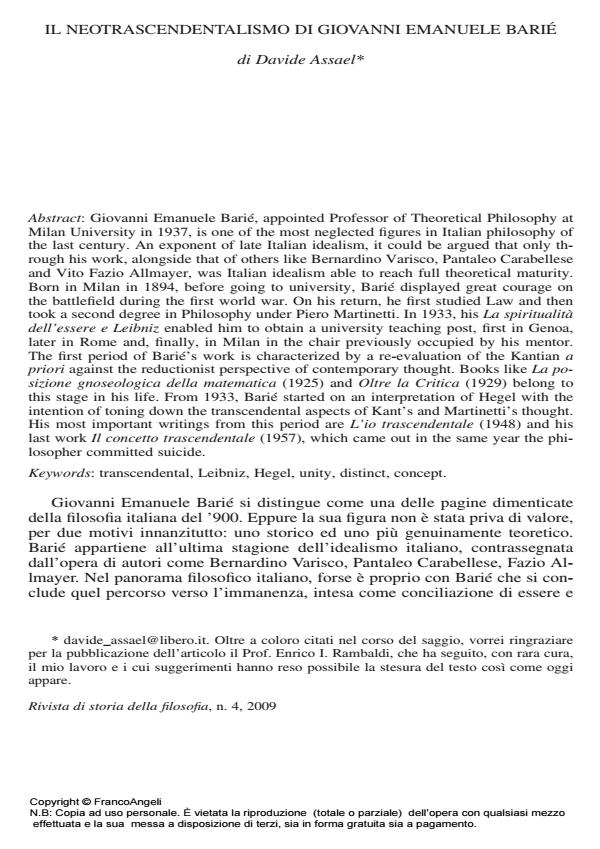Il neotrascendentalismo di Giovanni Emanuele Barié
Titolo Rivista RIVISTA DI STORIA DELLA FILOSOFIA
Autori/Curatori Davide Assael
Anno di pubblicazione 2009 Fascicolo 2009/4
Lingua Italiano Numero pagine 28 P. 731-758 Dimensione file 1020 KB
DOI 10.3280/SF2009-004003
Il DOI è il codice a barre della proprietà intellettuale: per saperne di più
clicca qui
Qui sotto puoi vedere in anteprima la prima pagina di questo articolo.
Se questo articolo ti interessa, lo puoi acquistare (e scaricare in formato pdf) seguendo le facili indicazioni per acquistare il download credit. Acquista Download Credits per scaricare questo Articolo in formato PDF

FrancoAngeli è membro della Publishers International Linking Association, Inc (PILA), associazione indipendente e non profit per facilitare (attraverso i servizi tecnologici implementati da CrossRef.org) l’accesso degli studiosi ai contenuti digitali nelle pubblicazioni professionali e scientifiche.
Il neotrascendentalismo di Giovanni Emanuele Barié - Giovanni Emanuele Barié, appointed Professor of Theoretical Philosophy at Milan University in 1937, is one of the most neglected figures in Italian philosophy of the last century. An exponent of late Italian idealism, it could be argued that only through his work, alongside that of others like Bernardino Varisco, Pantaleo Carabellese and Vito Fazio Allmayer, was Italian idealism able to reach full theoretical maturity. Born in Milan in 1894, before going to university, Barié displayed great courage on the battlefield during the first world war. On his return, he first studied Law and then took a second degree in Philosophy under Piero Martinetti. In 1933, his La spiritualità dell’essere e Leibniz enabled him to obtain a university teaching post, first in Genoa, later in Rome and, finally, in Milan in the chair previously occupied by his mentor. The first period of Barié’s work is characterized by a re-evaluation of the Kantian a priori against the reductionist perspective of contemporary thought. Books like La posizione gnoseologica della matematica (1925) and Oltre la Critica (1929) belong to this stage in his life. From 1933, Barié started on an interpretation of Hegel with the intention of toning down the transcendental aspects of Kant’s and Martinetti’s thought. His most important writings from this period are L’io trascendentale (1948) and his last work Il concetto trascendentale (1957), which came out in the same year the philosopher committed suicide.
Parole chiave:Ttranscendental, Leibniz, Hegel, unity, distinct, concept.
Davide Assael, Il neotrascendentalismo di Giovanni Emanuele Barié in "RIVISTA DI STORIA DELLA FILOSOFIA" 4/2009, pp 731-758, DOI: 10.3280/SF2009-004003